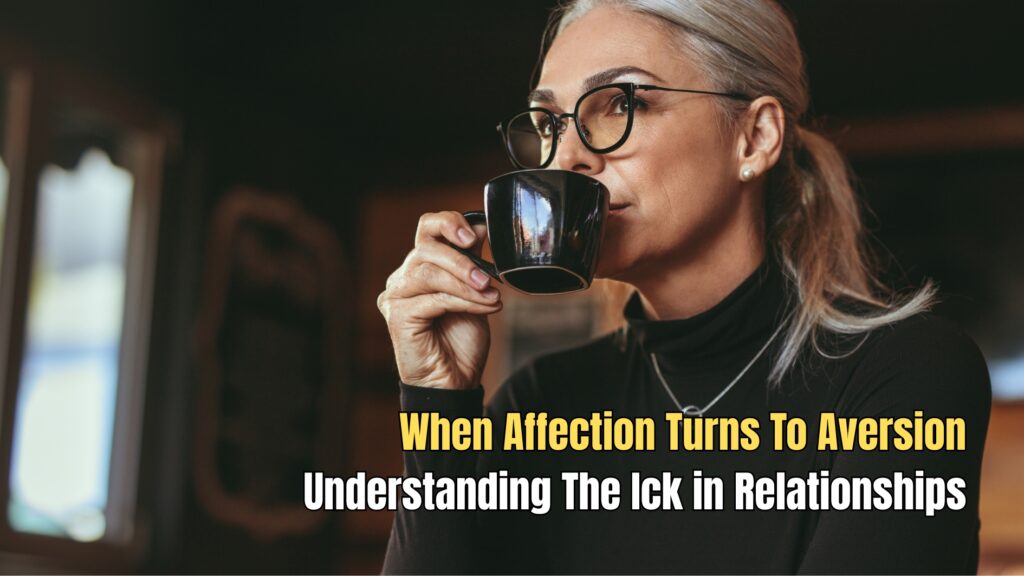The term “what is the ick” refers to a sudden, inexplicable feeling of repulsion toward someone you’re dating, often triggered by minor behaviors or traits. This visceral reaction can transform attraction into aversion, leaving you questioning your feelings and the future of the relationship.
🧠Understanding What Is The Ick
From an evolutionary standpoint, the ick may serve as a subconscious mechanism to identify unsuitable partners. Behaviors perceived as incompatible or undesirable can trigger this response, signaling potential issues in mate selection.
Emotional Triggers
The ick often arises from internal factors such as past traumas, unmet needs, or fears of intimacy. Recognizing these triggers is crucial for understanding whether the reaction is about the partner’s behavior or one’s own emotional landscape.
🔍 Common Triggers of the Ick
- Poor Hygiene: Neglecting personal cleanliness.
- Inappropriate Humor: Making offensive or ill-timed jokes.
- Overbearing Behavior: Displaying controlling tendencies.
- Lack of Ambition: Showing no drive or goals.
- Disrespectful Attitudes: Being rude to service staff or others.
📊 The Ick vs. Red Flags: A Comparison
| Aspect | The Ick | Red Flags |
|---|---|---|
| Nature | Sudden feeling of repulsion | Patterns of harmful behavior |
| Trigger | Minor behaviors or traits | Serious issues like abuse or dishonesty |
| Duration | Often temporary | Persistent and escalating |
| Response | Emotional discomfort | Necessitates boundary setting or exit |
| Resolution | May fade with time or understanding | Requires direct action or intervention |
- Self-Reflection: Assess whether the reaction stems from personal insecurities or genuine concerns.
- Open Communication: Discuss feelings with your partner to gain clarity.
- Seek Professional Help: Consider therapy to explore underlying issues.
- Give It Time: Allow space to see if feelings change.
- Trust Your Instincts: If discomfort persists, it may be best to move on.
🧑⚕️ Expert Insights
Dr. Naomi Bernstein, a clinical psychologist, notes that the ick can be a defense mechanism against potential hurt, signaling deeper fears or unresolved issues. Time
Professor Tom Sherman from Georgetown University explains that the ick may be linked to brain regions responsible for emotional processing, indicating an involuntary reaction to perceived incompatibility. Georgetown University
📝 Real-Life Case Study
Case: Emily, 28, started dating Alex, who was attentive and kind. However, she felt an unexpected aversion when he used baby talk.
Analysis: Upon reflection, Emily realized this behavior reminded her of a past partner who was emotionally immature.
Outcome: Through open communication, Alex understood her discomfort, and they worked together to address it, strengthening their relationship.
❓ FAQs : What Is The Ick
Q1.What causes the ick?
The ick can result from minor behaviors that trigger subconscious fears or past traumas, leading to sudden repulsion.
Q2.Is the ick a sign to end the relationship?
Not necessarily. It’s important to assess whether the feeling is about the partner’s behavior or one’s own emotional triggers.
Q3.Can the ick be overcome?
Yes, through self-reflection, communication, and, if needed, professional guidance.
Q4.Is the ick common?
Many people experience the ick at some point, especially in early stages of dating.
Q5.Does the ick indicate incompatibility?
It can, but it’s also possible that personal insecurities are at play.
Q6.How should I address the ick with my partner?
Approach the conversation with honesty and sensitivity, focusing on your feelings rather than blaming.
Q7.Can the ick happen in long-term relationships?
Yes, especially if unresolved issues resurface or new behaviors emerge.
Q8.Is the ick more prevalent in certain age groups?
Younger individuals, particularly Gen Z, report experiencing the ick more frequently, possibly due to social media influences.
Q9.Does gender influence the experience of the ick?
Studies suggest women may experience the ick more often, potentially due to higher sensitivity to certain behaviors.
Q10.Should I seek therapy if I frequently get the ick?
If the ick consistently hinders your relationships, therapy can help explore underlying causes.
🧭 Final Thoughts : What Is The Ick
Experiencing the ick is a common part of modern dating, often reflecting deeper emotional responses rather than surface-level issues. By understanding its origins and addressing it thoughtfully, individuals can navigate their relationships with greater clarity and compassion.
💡 Special Advice
If you find yourself frequently experiencing the ick, take time to reflect on your relationship patterns and consider seeking professional guidance to explore underlying causes.
📣 Call to Action
Have you experienced the ick in your relationships? Share your story in the comments below, and let’s foster a community of understanding and support.
Useful Articles :-
- Signs of Love Bombing: 7 Red Flags to Spot Manipulative Affection Early
- What Is a Situationship? 7 Unfiltered Truths About Modern Love
- 10 Signs of a Healthy Relationship: What To Look For
- Communication Skills for Couples: 7 Transformative Tips to Strengthen Your Connection
- 7 Powerful Ways to Build Healthy Relationship Boundaries for Lasting Love
- 9 Empowering Steps for Recovering from a Breakup: Heal, Grow, and Thrive
- 7 Powerful Long-Distance Relationship Advice : Tips to Keep the Spark Alive
- Jealousy in Relationships: 7 Powerful Ways to Manage the Green-Eyed Monster
- 5 Insights Into Love Languages in Relationships : Do They Really Work?
- What Does Emotional Safety In Relationships? 7 Biblical Keys to Building Trust and Intimacy